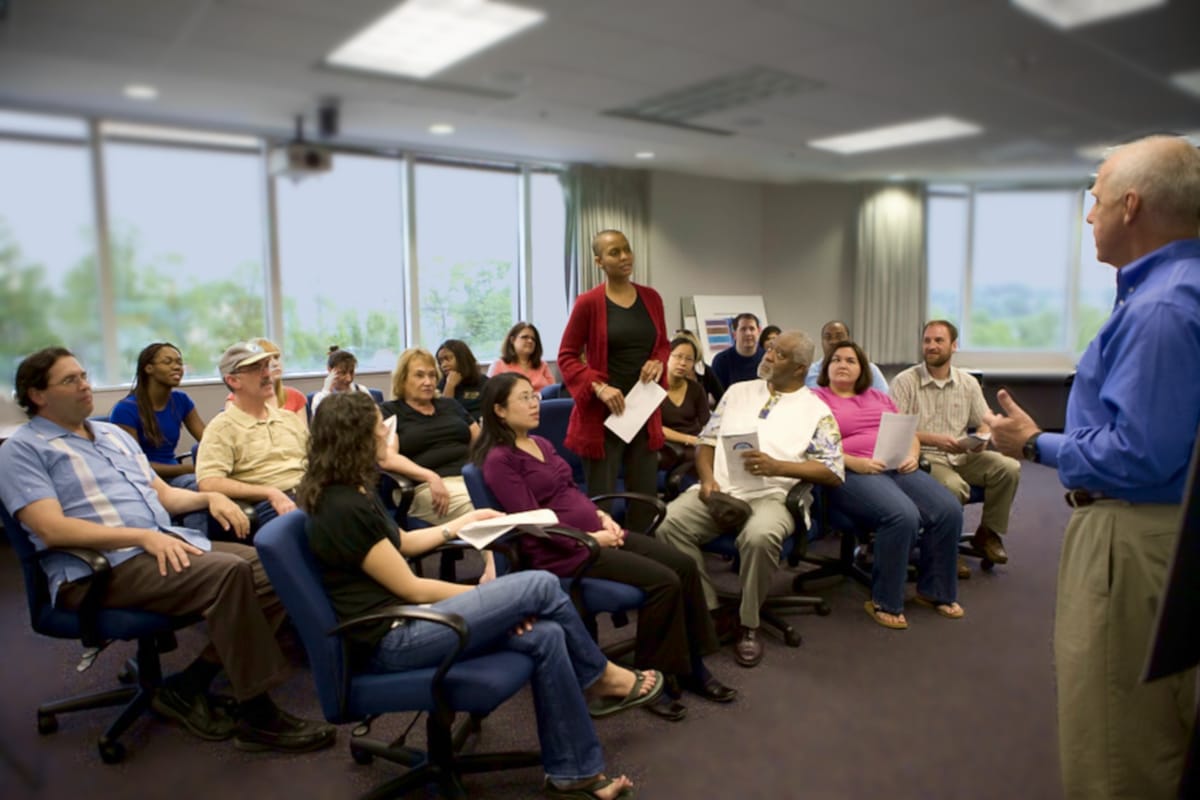Show Respect—Argue
If you have any faith in your neighbors, you will talk with them.


When a toddler, a mentally incompetent person, or a cat fails to appreciate the finer nuances of the painting in the living room, do you explain brush stroke techniques, or do you let it go? When your neighbor has the wrong idea about something that affects you and everyone else in your community, do you talk with that person, or do you smile silently because he is a simpleton who cannot reason his way out of a paper bag? What about your neighbors in general? And if they’re all incorrigible, then it makes sense to just leave, right?
The choice to leave or stay in your country is not simple. Of course, if your life is in danger, if you’re in a so-called “mixed” marriage and domestic terrorists have thrown Molotov Cocktails through your windows, moving makes a lot of sense. If your neighbors are just people you don’t like, then maybe you should stay because no place will improve if every good person leaves.
Arguably, we have a duty to stay in the places where we are and not shop around for the best fit for our preferences. Of four main models of ethics, one asks how things would be if everyone acted as we did. Two things result when all people move wherever they want: nothing changes in any place, and the world never gets better.
The oldest sense of morality is the mirror of lex talionis, or “an eye for an eye, and a tooth for a tooth.” Under lex talionis, if I destroy your ladder, then you get to destroy mine. The golden rule is to do unto others as you want them to do unto you. It makes a simple kind of sense. If you don’t want others to interrupt you when you’re talking, then you had better not interrupt others. For many situations, it works. For more complicated situations, it doesn’t.
If you were in need of a helicopter rescue, would you do the same for the pilot if she were in a similar need? You may not be able to fly. You couldn’t reciprocate the same way. Maybe you would help her in whatever way you could to save her life. But you may never encounter her again. We may have to abstract way certain elements and adopt a general Good Samaritan expectation. I would help a stranger I would never meet again because I would want someone who doesn’t know me to help me in an emergency.
Another model for ethics centers on first principles—Kantian ethics, in other words. As long as you have the accurate starting facts and sound morals to guide you, then you can figure what to do in almost every situation. For better and for worse, this sense of right and wrong is absolute and ignores context.
A common critique is that Kant said he wouldn’t utter a falsehood, even if it would stop a murder. “Where’s my target hiding?” “I cannot tell a lie. He’s hiding in that cabin over there.”
Constancy is invaluable in certain professions, however. You may have heard the medical mantra of “Do no harm.” Helping the war wounded regardless of nationality is noble, sure. And if I were in need of a life-saving procedure—if my appendix needed to be removed, for example—then I would want a hospital to help me. I wouldn’t want the attending surgeon to evaluate me as a person, stop to figure out if I am worthy of life, that I won’t go on to kill multiple people.
Utilitarianism contrasts sharply. You simply do the most good for the greatest number of people. Means and first principles are not relevant.
Let’s say I am a firefighter. I could rush into one burning building and save one man or run into the other burning building and save three children. Time is running out. I won’t have time to go to both. I have to make a decision now.
Emergency teams and field medics have to triage people. Some are beyond saving. Some can be saved if we act now. Some can wait. We have limited resources and try to save as many as we can.
On the other hand, utilitarianism has unsettling consequences for everyday life. If a hospital acted according to utilitarianism all the time, then it would make sense to intentionally kill a healthy patient during a check-up and then extract her two lungs, two kidneys, heart, and liver in order to save the lives of six others.
The model that raises the most questions for migration is whether the world would be better if everyone acted as you did. The major caveat is thus: Our instincts and deepest senses of morality tell us to protect ourselves and our children. If you have an option to get better food and security for your family, then that takes priority. However, if the place in which you reside is inconvenient and yet you have the chance to still get by—and especially if you have the power to improve things—then staying can be righteous.
Clearly, you shouldn’t have to live as a homebody just to survive. If you use a wheelchair and your city has lousy sidewalk maintenance, then moving to a new city makes sense. If some sight-related disability, age, or poverty means you do not drive, and a few things are inconvenient, but you can live a full life, then you may want to consider digging in your heels and talking to people. You may be able to find like-minded souls and convince others on the fence in order to push for positive changes in your town so that life is more pleasant for everyone.
Many places are far from perfect, and others are pretty close in some respects. But if everyone moved to fit their preferences, then how would your hometown improve? How would the place you want to see have ever become so good if the people who sought a better way of life had packed up and left twenty years ago?
The world changes too. A century ago, Los Angeles led the world in streetcars. Four decades ago, Holland was not much better than present-day Maryland in terms of bike friendliness or child safety. We know that the Netherlands improved because of mass organizing and some very narrow votes in government. If even twenty percent of the activists had left for Japan back then, it is doubtful that Amsterdam would look as it does today.
Everyone must find the sweet spot, however. You may need to move because you can find a community in Carmel, Indiana, but not in Fort Wayne. In an overly hostile place, you could pound on a brick wall until your hands bled, but this seems less virtuous and less appealing after you turn thirty years old. But if you have enough respect for your fellow citizens, then you shouldn’t dismiss them.
When you live near the ocean and your thirteen-year-old son rolls his eyes over concerns about rising sea levels, do you resign and just accept that he will live in blissful ignorance forever? Or, if you talked with him, would he understand why you and other parents care about this issue? In the same way, grant that your neighbors can be reasoned with—even if they don’t change overnight or adopt all of your views. (Did you pop into existence with perfect knowledge?)
Remember, you’re not truly alone. But you would be if everyone who thought the same had gotten up and left.





